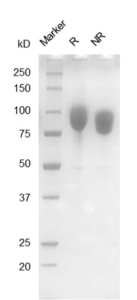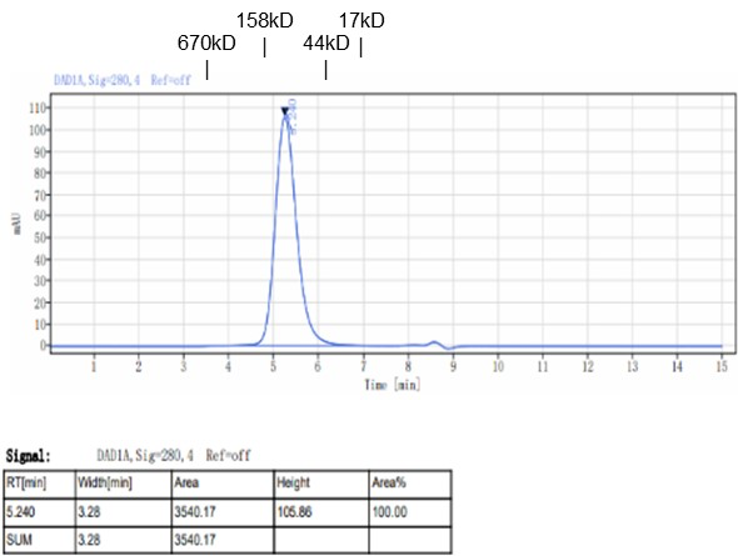hEGFR(25-645)-His
Description
Epidermal growth factor receptor (EGFR) is a Type I transmembrane glycoprotein and tyrosine kinase that binds ligands of the EGF family, activating several signaling cascades to convert extracellular cues into appropriate cellular responses. The ligand binding triggers homo- and/or heterodimerization of the receptor, leading to autophosphorylation on key cytoplasmic residues. Subsequently, the phosphorylated receptor recruits adapter proteins such as GRB2, which in turn activate complex downstream signaling cascades. EGFR signaling regulates various biological functions including cell proliferation, differentiation, motility and apoptosis. EGFR is frequently overexpressed in diverse tumors and serves as a target of several anti-cancer drugs. Specifically, EGFRvIII has been identified as relevant in numerous cancer types, due to its tumor-specific expression without detection in normal tissues. This variant exhibits high tumorigenicity, and can induce aggressive tumor phenotype characterized by increased invasion, proliferation, angiogenesis and evasion of apoptosis. This EGFRvIII-mediated enhanced tumorigenic properties combined with its absence in normal tissue make it an ideal therapeutic target. EGFR kinase inhibition holds great promise for cancer therapeutics and involves developing drugs to address EGFR-mutation conferred resistance.
Product name | hEGFR(25-645)-His |
Species | Homo sapiens |
Expression system | HEK293 |
Buffer | PBS, pH 7.4 |
Delivery condition | Dry ice (-80°C) |
Delivery Time | 1 week if in stock; 4 weeks if production needed |
Storage condition | Store at -80°C |
Brand | BioMetas |
Applications | Angiogenesis/Cardiovascular Research, Cancer Biomarkers, Cancer Research, Cell Culture, Immune Checkpoint, Immune System, Immunotherapy, Inflammation Research, Neurobiology Research, Stem Cells & Differentiation, Targeted Therapy, Wound Healing |
Aliases/Synonyms | ERBB, ERBB1, HER1, PIG61, mENA, NISBD2 |
Reference | |
Note | For research use only. Not suitable for clinical or therapeutic use. |
Size | 1mg, 5mg, 10mg, 50mg, 100mg |
Brand | BioMetas |
Product type | Antigen |
Expression system | HEK293 |
Applications | Angiogenesis/Cardiovascular Research, Cancer Biomarkers, Cancer Research, Cell Culture, Immune Checkpoint, Immune System, Immunotherapy, Inflammation Research, Neurobiology Research, Stem Cells & Differentiation, Targeted Therapy, Wound Healing |
Contact Us for a Quote!
Data Gallery
Fig. 1.) 4-20% SDS-PAGE analysis
Recombinant protein was visualized by Coomassie Brilliant Blue R250 staining.

Fig. 2.) SEC-HPLC analysis
Column: Superdex 200 Increase 5/150 GL
Running buffer: 2xPBS, pH 7.4
